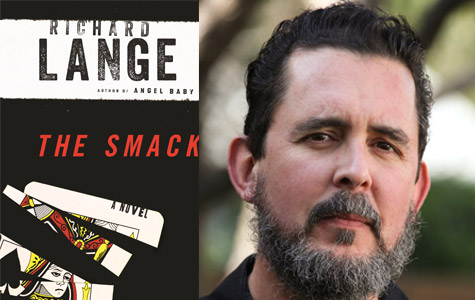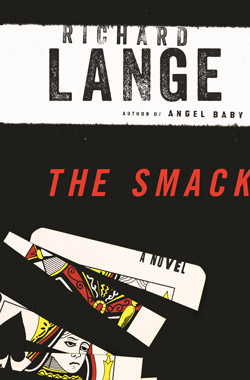
Richard Lange is a novelist and short story writer. His full-length fiction credits include This Wicked World and Angel Baby; his story collections are titled Dead Boys and Sweet Nothing. Mr. Lange is the recipient of a Guggenheim Fellowship, the International Association of Crime Writers' Hammett Prize, and the Rosenthal Family Foundation Award from the American Academy of Arts and Letters. His newest, The Smack (available now), is published by Mulholland Books and has earned praise from both critics and contemporaries.
The Los Angeles-based author recently answered some questions about creative inspiration, unsympathetic characters, telling details, and boundary pushing, among other topics of discussion.
What was the impetus for writing The Smack? Also, how do you challenge yourself to reach new creative heights with each successive book (or story)?
The impetus for The Smack came from a story in the L.A. Times about a crew of American soldiers who conspired to steal U.S. funds in Afghanistan and smuggle them back to the U.S. The scam went down just as described in the book, but the difference is it’s two million dollars in the book and five million in real life. I’d been wanting to write about a con-man/gambler for a while and decided Rowan Petty would be a perfect way into the story.
As for reaching new heights, I’m always trying to outdo myself and become a better writer. I don’t even like to look at my older work. All I see are the things that never quite got to where I wanted them to be. I’m always eager to start a new project and see how I’ve improved.
 Rowan Petty is a down-on-his-luck con artist looking to make a big. Are there inherent difficulties in making such a character empathic? Also, how are his struggles representative of a more universal, “real-life” desperation or discontentment?
Rowan Petty is a down-on-his-luck con artist looking to make a big. Are there inherent difficulties in making such a character empathic? Also, how are his struggles representative of a more universal, “real-life” desperation or discontentment?
That’s a challenge I take on as a writer, populating my stories with “unsympathetic” characters, then getting readers to care about them. Mainstream “heroes” bore me. It’s much more interesting when someone who shouldn’t do “right” does. There’s real drama in that transformation. Even the villains in my stories are treated as fully rounded characters. You may not like them, but at least you will see where they are coming from and why they do what they do. I’m all about empathy. There’s too little of it around these days.
Rowan’s struggles are indeed a mirror of the struggles of many people. I amp up the stakes and the desperation, but I hope the reader sees a bit of him or herself in all of the characters in my books. Plot-wise, I keep things moving for those who just want excitement, but there’s also a lot of social and psychological commentary going on between the lines for those who like something deeper.
You currently make your home in Los Angeles, where much of the story is set. What have you found to be the key(s) to achieving an authentic sense of time, place, and people, and how important is it for you to know your story settings intimately?
Achieving authenticity is all about choosing the right details to call out. You can’t overdo it, or you start sounding like an encyclopedia entry. You can’t give too little because then we’re in Anywhere, USA.
L.A. is easy for me because I’ve lived there for almost 40 years. I set most of my books there so I can concentrate on other aspects of the story besides researching the setting. Parts of The Smack, however, are set in Afghanistan and North Carolina—places I’ve never been. In those cases, I was careful to do enough research but not too much. The internet makes it very easy to get as detailed as you want, down to taking “walking tours” through Google maps.
There tends to be distinction between “genre fiction” and “literature,” and yet you’ve earned kudos for bridging that perceived gap. How do you conceptualize your own work, and in what ways can industry classification both help and hinder an author?
I don’t contextualize my work at all. It’s plain old fiction to me. I recognize that there are elements of genre in my books, and that’s intentional, but I’m always trying to push the boundaries. Most genre fiction is concerned mainly with plot, but that’s the least interesting part of the story to me. I’m more interested in character, setting, and rhythm, from word to word, sentence to sentence, and paragraph to paragraph. I draw readers in with crime, but I try to give them something more. The marketing folks can then call it whatever will sell the most books.
In addition to novels, you also write short stories. What are the unique challenges and liberties of each format, and how do you know which one an idea warrants?
My short stories are less structured than the novels—more like a series of snapshots of a character that are held together and given resonance by a loose narrative. The novels have much more complex plots. I like novels that move along, novels where things happen, so those are the kinds of novels I write. If I’m going to spend that much time reading a book, I want to go somewhere and see something.
Short stories are my first love, but you can’t make a living writing them, and I need to make a living. Novels are much more challenging for me because of the need to juggle plot, character, tone, and writing style. That’s a lot of balls to keep in the air. It’s a constant battle to maintain the right ratio. I’m still struggling with this. I thought it would get easier as I went along, but it hasn’t. It’s probably time to accept that it never will.
Leave us with a teaser: What comes next?
I’ve been working on TV and movie projects since finishing The Smack, trying to get my hands on some of that Hollywood money. But I feel a new novel welling up, so it’ll soon be time to settle in for a couple years of agony and ecstasy as I struggle to get it perfect this time.
To learn more or order a copy, visit:
opens in a new window![]() opens in a new window
opens in a new window![]()
Richard Lange is the author of the story collections Dead Boys and Sweet Nothing and the novels This Wicked World and Angel Baby. He is the recipient of a Guggenheim Fellowship, the International Association of Crime Writers' Hammett Prize, and the Rosenthal Family Foundation Award from the American Academy of Arts and Letters. He lives in Los Angeles.
John Valeri wrote the popular Hartford Books Examiner column for Examiner.com from 2009 – 2016. He can be found online at www.johnbvaleri.com and is featured in the Halloween-themed anthology Tricks and Treats, now available from Books & Boos Press.
